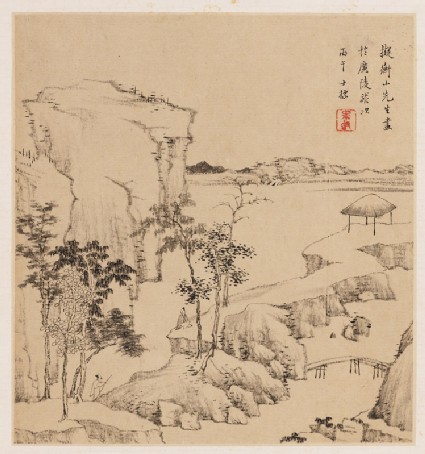Chinese Landscapes from the Ashmolean Collection
(from 9th Feb until 21st Jul 2013)Explore the continued tradition of Chinese landscape painting in this complement to the Xu Bing show.

- Reference URL
Actions
River landscape
-
Description
Zha Shibiao, also known as Meihe or Erzhan, was from Xin’an in Anhui province. He is regarded as one of the four masters of the Xin’an School, and is renowned for his dry brushwork and sparse composition. The artist studied for the civil service examinations before the fall of the Ming dynasty, and it has been suggested that his subsequent departure from official life in favour of painting may have been prompted by lack of sympathy for the new rule.
From the 1670s onwards Zha Shibiao lived in Yangzhou. His family owned collections of paintings and bronzes, and he himself was a connoisseur. In painting he followed his contemporary Hong Ren (1610-1664) and master from the Yuan dynasty, Ni Zan (1301-1374). According to the inscription, this particular painting is after Wen Zhengming (1470-1559), also known as Hengshan xiansheng, and was painted during a trip to Yangzhou in 1666.
-
Details
- Associated place
-
Asia › China › Jiangsu province › Yangzhou (place of creation)
- Date
- 1666
- Artist/maker
-
Zha Shibiao (1615 - 1698) (artist)style of Wen Zhengming (1470 - 1559) (artist)
- Material and technique
- ink on paper
- Dimensions
- 17.2 x 18.3 cm approx. (height x width)
- Material index
- Technique index
- Object type index
- No. of items
- 1
- Credit line
- Purchased with the assistance of the MLA/V&A Purchase Grant Fund, theArt Fund, and Friends of the Ashmolean Museum, 1980.
- Accession no.
- EA1980.141
-
Further reading
Vainker, Shelagh, Chinese Paintings in the Ashmolean Museum, Oxford (Oxford: Ashmolean Museum, 2000), no. 158 on p. 182, illus. p. 183 fig. 158
Past Exhibition
see (1)Location
-
- currently in research collection
Objects are sometimes moved to a different location. Our object location data is usually updated on a monthly basis. Contact the Jameel Study Centre if you are planning to visit the museum to see a particular object on display, or would like to arrange an appointment to see an object in our reserve collections.
Publications online
-

Chinese Paintings in the Ashmolean Museum, Oxford
Zha Shibiao was from Haiyang near Xiuying in Anhui province and is associated with the Anhui School, renowned for dry brushwork and sparse composition. Zha Shibiao studied for the civil service examinations before the fall of the Ming dynasty, and it has been suggested that his subsequent departure from official life in favour of painting may have been prompted by lack of sympathy for the new rule. His family owned collections of paintings and bronzes and he himself was a connoisseur. In painting he followed his near contemporary Hong Ren and the Yuan master Ni Zan. From the 1670s onwards he lived in Yangzhou.
Notice
Objects from past exhibitions may have now returned to our stores or a lender. Click into an individual object record to confirm whether or not an object is currently on display. Our object location data is usually updated on a monthly basis, so please contact the Jameel Study Centre if you are planning to visit the museum to see a particular Eastern Art object.
© 2013 University of Oxford - Ashmolean Museum


